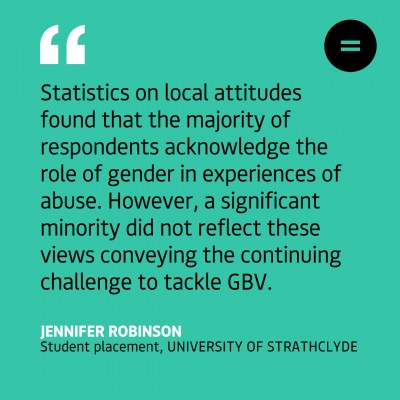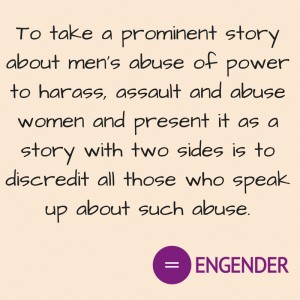Engender blog
GUEST POST: Gender-Based Violence Policies at the Local Authority Level Part 2
Today we're publishing the next in a series of blogs from two student placements Engender is hosting from the University of Strathclyde Applied Gender Studies and Research Methods course. These blogs explore women's representation and decision-making around women's equality in local authorities across Scotland. You can see other blogs in the series here.
In 2020 Jennifer Robinson graduated with an honours degree in Society Politics and Policy from the University of the West of Scotland. She is now undertaking a Masters in Applied Gender Studies and Research Methods with a particular interest in feminist disability studies. She has previously written for the Glasgow Women’s Library and you can find her tweeting about feminism and disability on twitter @JenRobinson95.
-400.png)
As part of my Msc Applied Gender Studies and Research Methods I am undertaking a placement with Engender to research gender equality within Renfrewshire Council and Edinburgh Council. In my previous blog post I explored Renfrewshire council’s gender-based violence policies and funding decisions. In my final blog post I will outline Edinburgh Council’s Domestic Abuse Housing Policy, their council budget and transport policies.
GUEST BLOG: Gender-Based Violence Policies at the Local Authority Level Part 1
Today we're publishing the fourth in a series of blogs from two student placements Engender is hosting from the University of Strathclyde Applied Gender Studies and Research Methods course. These blogs explore women's representation and decision-making around women's equality in local authorities across Scotland. You can see other blogs in the series here.
In 2020 Jennifer Robinson graduated with an honours degree in Society Politics and Policy from the University of the West of Scotland. She is now undertaking a Masters in Applied Gender Studies and Research Methods with a particular interest in feminist disability studies. She has previously written for the Glasgow Women’s Library and you can find her tweeting about feminism and disability on twitter @JenRobinson95.

As part of my Msc Applied Gender Studies and Research Methods degree I have been on placement with Engender to investigate gender representation at the local authority level. My previous blog post highlighted the number of women councillors within Renfrewshire Council and Edinburgh Council. Since then I have been exploring key policies within each council designed to address gender-based violence (GBV). In this blog post I will outline some of Renfrewshire’s key gender-based violence policies.
Renfrewshire Council’s GBV Strategy
In 2014 the Scottish government published “Equally Safe: Scotland's Strategy to prevent and eradicate violence against women and girls”. This strategy conveys the responsibility that all levels of society, including the local authority level, have in tackling violence against women and girls. In response to Equally Safe, Renfrewshire launched “Equally Safe in Renfrewshire: Renfrewshire’s No to Gender-Based Violence Strategy 2018-2021”. The strategy details the aim to establish Renfrewshire as a place where GBV is not tolerated and those affected by GBV are provided with support.
Key GBV statistics outlined in the document demonstrate the prevalence of domestic abuse and sexual crimes in Renfrewshire. Statistics on local attitudes found that the majority of respondents acknowledge the role of gender in experiences of abuse. However, a significant minority did not reflect these views conveying the continuing challenge to tackle GBV. Furthermore, a “ChildrenCount Wellbeing Survey” uncovered the prevalence of emotional control in teenage intimate relationships. Importantly, the strategy takes an intersectional approach by recognising the diverse impact of GBV on BME women, LGBT people, people with disabilities, refugee women, women with no recourse to public funds and women with complex needs.
A progress report of the GBV strategy is published annually during the 16 Days of Action (25th November – 10th December). I was curious to see these annual reports. However, trying to find council reports is challenging. After exploring the Renfrewshire council website, I came across a link which took me to Renfrewshire’s committee and councillor’s website. The website contains the various committees and their members, minutes from committee meetings and council documents and reports. Here, I typed “gender-based violence” into the search bar and found the GBV Strategy year 1 review and the GBV Strategy year 2 mid-year review. While reading these I uncovered an interesting policy. Under the GBV strategy, Renfrewshire launched a Domestic Abuse Policy for staff in 2019:
Renfrewshire’s Domestic Abuse Policy for Staff
Renfrewshire was one of the first local authorities in Scotland to introduce a Domestic Abuse Policy for staff. The purpose of this policy is to demonstrate Renfrewshire’s zero-tolerance approach to domestic abuse. The policy has been developed in line with Equally Safe and complies with the Domestic Abuse (Scotland) Act 2018 which criminalises many forms of abuse, including psychological abuse and coercive control. According to the Human Rights Commission, 75% of people who experience domestic abuse are targeted at work, showing the importance of implementing guidance for staff.
Under the policy, employees experiencing domestic abuse can request up to 10 days paid leave per annum. The policy provides guidance for staff that experience domestic abuse and guidance on how to recognise if a colleague is experiencing domestic abuse. For instance, this could be changes in behaviours, changes in timekeeping, changes in work performance or isolating themselves. The policy also outlines the steps managers should take if they suspect an employee is experiencing domestic abuse.
F-words: Reporting violence against women
-400.png)
Iris Pase is an Italian freelance journalist based in Glasgow. Passionate about feminism, human rights and postcolonialism, she worked on Newsmavens’ feminist debunking and fact-checking project “Femfacts”. She's currently one of the blog editors at YWCA Scotland, where she’s created Femtorial, an Instagram project which aims at making feminist discourse accessible. You can find her work in The Independent, HUCK Magazine, and Culture Trip, among others.
According to the World Health Organisation, about 35% of women worldwide have experienced either physical and/or sexual violence in their lifetime. This means that one in every three women will experience violence at least once in her life and just on the basis of gender. As a consequence, she might have mental and physical health problems afterwards.
Why There Aren’t Always Two Sides to Every Story
Here at Engender we receive frequent requests to go on the radio, TV or in front of a live audience to ‘debate’ feminist issues.
To discuss whether the pay gap really exists, whether a video of shirtless men doing yoga is proof of ‘reverse sexism’ in Scotland, or whether it’s unfair that women are now allowed to play golf.

We tend to refuse these requests, and are subsequently charged with failure to represent feminist arguments, failure to take advantage of an opportunity to reach a wider listenership, or simply allowing sexist views to go unchallenged. We argue that to partake in a debate which shouldn’t ever be a debate in the first place is a far more dangerous failure.
Scotland's Programme for Government - what's in it for women?
In the past week there’s been a slight autumn chill in the air in the mornings, and a pleasing back-to-school vibe in genderland that speaks of newly sharpened pencils and fresh notebooks.
Autumn is a season of new beginnings, as well as mellow fruitfulness, and the last few days has seen the launch of Scotland’s Programme for Government as well as Engender’s own Gender Matters Roadmap.
Downloads
 Engender Briefing: Pension Credit Entitlement Changes
From 15 May 2019, new changes will be introduced which will require couples where one partner has reached state pension age and one has not (‘mixed age couples’) to claim universal credit (UC) instead of Pension Credit.
Engender Briefing: Pension Credit Entitlement Changes
From 15 May 2019, new changes will be introduced which will require couples where one partner has reached state pension age and one has not (‘mixed age couples’) to claim universal credit (UC) instead of Pension Credit.
 Engender Parliamentary Briefing: Condemnation of Misogyny, Racism, Harassment and Sexism
Engender welcomes this Scottish Parliament Debate on Condemnation of Misogyny, Racism, Harassment and Sexism and the opportunity to raise awareness of the ways in which women in Scotland’s inequality contributes to gender-based violence.
Engender Parliamentary Briefing: Condemnation of Misogyny, Racism, Harassment and Sexism
Engender welcomes this Scottish Parliament Debate on Condemnation of Misogyny, Racism, Harassment and Sexism and the opportunity to raise awareness of the ways in which women in Scotland’s inequality contributes to gender-based violence.
 Gender Matters in Social Security: Individual Payments of Universal Credit
A paper calling on the Scottish Government to automatically split payments of Universal Credit between couples, once this power is devolved to the Scottish Parliament.
Gender Matters in Social Security: Individual Payments of Universal Credit
A paper calling on the Scottish Government to automatically split payments of Universal Credit between couples, once this power is devolved to the Scottish Parliament.
 Gender Matters Manifesto: Twenty for 2016
This manifesto sets out measures that, with political will, can be taken over the next parliamentary term in pursuit of these goals.
Gender Matters Manifesto: Twenty for 2016
This manifesto sets out measures that, with political will, can be taken over the next parliamentary term in pursuit of these goals.
 Scottish NGO Briefing for UN Special Rapporteur on Violence Against Women
Joint briefing paper for the UN Rapporteur on Violence Against Women.
Scottish NGO Briefing for UN Special Rapporteur on Violence Against Women
Joint briefing paper for the UN Rapporteur on Violence Against Women.

Newsletter
Sign up to receive our newsletter here:
Sign up to our mailing list
Receive key feminist updates direct to your inbox: